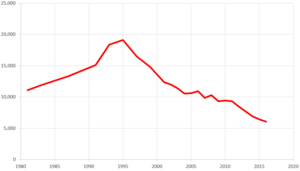Crime in the United Kingdom
Responsibility for crime in England and Wales is split between the Home Office, the government department responsible for reducing and preventing crime,[1] along with law enforcement in the United Kingdom; and the Ministry of Justice, which runs the Justice system, including its courts and prisons.[4] As of January 2018 police figures have shown a sharp increase in violent crime and sex offences rates over the last few years.[6][7][8][9] In January 2025, the UK announced to introduce a groundbreaking sanctions regime targeting people smugglers, aiming to disrupt criminal networks behind Channel crossings.The plan was announced by David Lammy, which included measures like asset freezes and travel bans, supported by Labour's £150 million-funded Border Security Command to enhance surveillance and intelligence.Priti Patel criticized the government for abandoning the Rwanda deportation scheme and questioned its effectiveness in tackling illegal migration.[13] Among the differences with common law legal systems are that juries in Scotland have 15 members, and only need a simple majority in order to give a verdict.The proportions had remained constant over the previous 5 years[15] In England and Wales, there were 618,000 recorded "violence against the person" crimes which caused an injury in 2015.While only a few people may have been able to attend a trial or an execution, these stories allowed for the entertainment of such events to be extended to a much greater population.[26] These real crime stories depicted the gruesome details of criminal acts, trials and executions with the intent to "articulate a particular set of values, inculcate a certain behavioral model and bolster a social order perceived as threatened".For example, the epitaph of John Smith, a highway thief and murderer, said: "thereto remain, a Terrour to affright All wicked Men that do in Sins delight... this is the Reason, and the Cause that they May Warning take."[27] The epitaph ends with the Latin phrase Faelix quem faciunt aliena pericula cantum, which means "fortunate the man who learns caution from the perils of others".

violent crimeUnited Kingdomjudicial systemsEngland and WalesScotlandNorthern IrelandHome Officelaw enforcement in the United KingdomMinistry of JusticecourtsprisonsCrown Office and Procurator Fiscal ServiceDavid LammyPriti Patelmagistrates' courtindictmentCrown Courtjustice of the peace courtsSheriff Courtjury trialHigh Court of Justiciarymurdercommon lawnot provenCrime statistics in the United KingdomCrime in Northern IrelandrobberyCrime in LondonGreater ManchesterCrime SurveyCrime Survey for England and Walesfull time equivalentfire-raisingvandalismprison populationPolice Service of Northern Irelandearly modern BritainpamphletsbroadsideschapbooksThe Newgate CalendargossipexecutionepitaphsLatin phraseFraud in the United KingdomRace and crime in the United KingdomGangs in the United KingdomUnsolved murders in the UKMajor crimes in the United KingdomTerrorism in the United KingdomSexual offences in the United KingdomCrime in EnglandCrime in WalesCrime in ScotlandCrime in LiverpoolGun crime in south ManchesterThe Justice GapThe GuardianHistoryChronologyFormationUnion of England and Scotland Act 1603Treaty of UnionActs of Union 1707Union with Scotland (Amendment) Act 1707Georgian eraVictorian eraEdwardian eraFirst World WarInterwarcivilianmilitarypoliticalsocialEconomicEmpireForeign relations1814–1919Law enforcementMaritimeMass surveillanceTaxationWomen's historyGeographyAdministrativeCounties of the United KingdomCountries of the United KingdomCrown DependenciesOverseas territoriesCity statusFormer coloniesPhysicalBritish IslesterminologyGreat BritainClimatechangeCoastlineGeologyLakes and lochsMountainsRiversVolcanoesResourcesAgricultureEnergybiodieselgeothermalhydraulic frac.hydroelectricityNorth Sea oilRenewable energyEnglishScottishHuntingforestryminingPoliticsConstitutionCorruptionDevolutionElectionsBy-electionsHuman rightsJudiciary